Allegheny Welcomes New Faculty
From a former resident of nearby Townville to a fantasy football player to a dedicated amateur chef, Allegheny’s new faculty members bring many unique backgrounds and qualities to the teaching table in the fall of 2018. Let’s meet each of them briefly:
Catherine Allgeier
Visiting Assistant Professor of Economics
 As a visiting assistant professor of economics, Catherine Allgeier comes to Allegheny with her bachelor’s and master’s degrees from Clarion University of Pennsylvania.
As a visiting assistant professor of economics, Catherine Allgeier comes to Allegheny with her bachelor’s and master’s degrees from Clarion University of Pennsylvania.
After graduation, she taught at a business college and then worked in the corporate world as a chief financial officer and a human resources director. “I realized that I missed the interaction with students and started teaching part-time in addition to my CFO role. I now have been teaching full-time for eight years (most recently at her alma mater) and use my corporate background to provide real-world accounting examples and experiences to my students,” says Allgeier.
“I am interested in information systems and communication, as they relate to costs and effectiveness in health-care diagnoses, such as using Watson as a diagnostic tool and the implications in not only a more timely diagnosis but also more cost effective,” she says.
She also has a green thumb. “My ‘other’ career would be in landscape and interior design,” says Allgeier. “I quit counting at 40 houseplants.”
Timothy Bianco
Assistant Professor of Economics
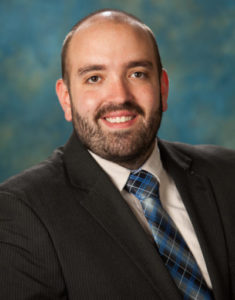 Timothy Bianco joins Allegheny as assistant professor of economics, having taught previously at Bowling Green State University, where he also earned his bachelor’s and master’s degrees. He also obtained a master’s degree and his doctorate from the University of Kentucky. He also has worked as an analyst at the Federal Reserve Bank of Cleveland for five years.
Timothy Bianco joins Allegheny as assistant professor of economics, having taught previously at Bowling Green State University, where he also earned his bachelor’s and master’s degrees. He also obtained a master’s degree and his doctorate from the University of Kentucky. He also has worked as an analyst at the Federal Reserve Bank of Cleveland for five years.
“I enjoy teaching economics and researching cutting-edge financial and monetary economics, focusing on corporate credit,” says Bianco.
Bianco and his wife, Victoria, grew up in northeast Ohio “so moving to northwest Pennsylvania has been a smooth transition. I am a Cleveland sports fanatic and I enjoy traveling to Cleveland to catch a game from time to time.
“An unusual combination is that I have been known to apply cutting-edge econometric techniques to playing fantasy football,” he says.
Paula Burleigh
Visiting Assistant Professor of Art History
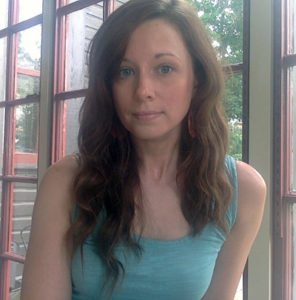 Paula Burleigh joins the Allegheny community as visiting assistant professor of art history and director of the Penelec, Bowman, Meghan Art Gallery. She earned her Ph.D. in art history at the Graduate Center of the City University of New York.
Paula Burleigh joins the Allegheny community as visiting assistant professor of art history and director of the Penelec, Bowman, Meghan Art Gallery. She earned her Ph.D. in art history at the Graduate Center of the City University of New York.
She earlier earned a master’s degree at Case Western Reserve University and a bachelor’s degree at Emory University.
“I’ve taught undergraduate courses at City University of New York Baruch College, Bard High School Early College, and at Bard College, and I’ve taught adult education courses at the Museum of Modern Art (New York) and at the Whitney Museum of American Art, where I was a teaching fellow for several years before coming to Allegheny,” says Burleigh.
Burleigh specializes in art history and visual culture of Europe and the United States, from 1945 to the present. Her research interests include visionary architecture, feminism and gender as they relate to art, and utopian/dystopian themes in art and popular visual culture.
“I love to cook, and I didn’t let a decade of tiny New York City kitchen life stop me from elaborate culinary experiments — some failed, many succeeded, all were eaten at least an hour later than I intended,” she says.
Kimberly Caldwell
Visiting Assistant Professor of Psychology
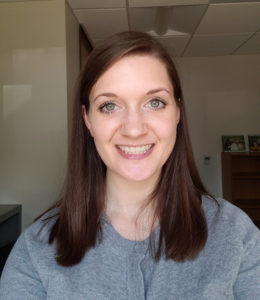 Kimberly Caldwell joins the college as a visiting assistant professor of psychology. She earned her Ph.D. in behavioral neuroscience at the University at Buffalo, “so my background is a blend of psychology and neuroscience.”
Kimberly Caldwell joins the college as a visiting assistant professor of psychology. She earned her Ph.D. in behavioral neuroscience at the University at Buffalo, “so my background is a blend of psychology and neuroscience.”
She has taught introductory psychology and biopsychology, “and I am excited to be teaching a new course this semester that I developed called ‘Ingestive Behavior,’ which will explore the neuroscience behind eating and drinking. My research interests are broadly focused on how the brain controls eating and drinking, thus the inspiration for my new class. I am particularly interested in a peptide system called ghrelin that is capable of influencing both behaviors.
“Along with behavioral neuroscience, I have always enjoyed the arts and took several art classes through high school and even a couple here at Allegheny as a member of the Gifted Program — I don’t know if they still call it that, it’s been a while since I was in high school — at Maplewood,” she says.
“This brings me to my fun fact, I grew up locally in nearby Townville and took classes at Allegheny in art and dance while in high school.”
Michael Michaelides
Assistant Professor of Economics
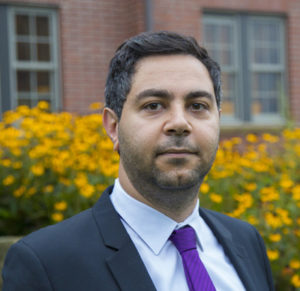 Michael Michaelides joins the Economics Department as an assistant professor. He has a bachelor’s degree in accounting and finance from the University of Essex, a master’s degree in accounting and finance from the London School of Economics, a master’s degree in economics from Virginia Tech, and a doctorate in economics from Virginia Tech.
Michael Michaelides joins the Economics Department as an assistant professor. He has a bachelor’s degree in accounting and finance from the University of Essex, a master’s degree in accounting and finance from the London School of Economics, a master’s degree in economics from Virginia Tech, and a doctorate in economics from Virginia Tech.
Prior to attending Allegheny, Michaelides spent one year as a visiting assistant professor at Sweet Briar College in Virginia. His research interests include: Financial econometrics, empirical asset pricing, time series econometrics, applied econometrics, behavioral finance, volatility modeling, and financial risk forecasting.
“My research has focused on exploring the behavioral biases of investing through the quantitative application of statistical and mathematical models. Yet, my research has been so strongly influenced by the philosophy of science literature,” says Michaelides.
When not in the classroom or on a research mission, Michaelides is a Liverpool Football Club supporter.
Matthew Mitchell
Visiting Assistant Professor of Philosophy and Religious Studies
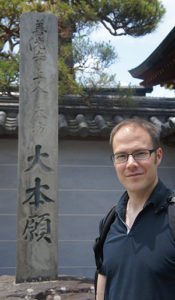 Right out of college, Matthew Mitchell traveled to Japan and taught English as a foreign language for six years. He had earned a bachelor’s degree in religious studies, with a minor in chemistry, from Illinois Wesleyan University. As an undergraduate, he also found time to sing in the university choir and teach rock climbing.
Right out of college, Matthew Mitchell traveled to Japan and taught English as a foreign language for six years. He had earned a bachelor’s degree in religious studies, with a minor in chemistry, from Illinois Wesleyan University. As an undergraduate, he also found time to sing in the university choir and teach rock climbing.
Mitchell later completed an M.A. in Asian religions from the University of Hawaii at Manoa and a Ph.D. from Duke University’s Graduate Program in Religion. “I spent a lot more time in my office writing than on the beach,” he said of his two years in Hawaii.
Mitchell’s teaching experience includes posts at the University of Hawaii, Duke University, the University of Nebraska at Omaha and Creighton University. And he worked at the University of Nebraska Medical Center, helping to bring Chinese students and scholars to the institution for short-term and degree programs.
Mitchell’s research interests include Asian religions — especially Japanese Buddhism, social history, and women and gender in religion. This year in the Religious Studies Department, he will be teaching a number of courses across traditions from Asian religions to Islam. He is currently studying the social, financial and legal activities of a group of Buddhist nuns in Japan’s 17th–20th centuries. “One of the biggest surprises people have is the diversity of the nuns’ activities,” he says. “Most people tend to think of nuns as cloistered, not active, and certainly not involved in gambling or lawsuits.”
Along with Japan’s importance to Mitchell’s research, the nation holds other special meaning for him: it’s where he met his wife and it’s the birthplace of his oldest daughter.
Pamela Runestad
Assistant Professor of Global Health Studies
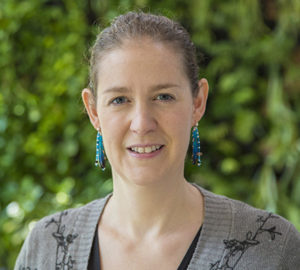 Pamela Runestad likes to know how things work.
Pamela Runestad likes to know how things work.
“I found I could fold all of my interests — infectious disease, nutrition, culture, Japan, writing and narrative, and film — together through becoming a medical anthropologist,” she says. “These combinations will be at the heart of my courses in global health studies here at Allegheny.”
Runestad holds a B.A. in biology and English — with a minor in psychology — from Augustana College (now University) in South Dakota and an M.A. in Japanese language and society from the University of Sheffield in the United Kingdom. She also earned an M.A. and Ph.D. in medical anthropology with a focus on Japan at the University of Hawaii at Manoa in Honolulu.
Her doctoral research focused on socio-cultural responses to HIV/AIDS in Japan and how those have an impact on health. Her current research project explores institutional food for pregnant and postpartum mothers in Japan.
Runestad’s life and work experiences outside of the continental U.S. give her unique perspective. “I grew up in Anchorage, Alaska, and I lived in Nagano, Japan, for 10 years,” she says. “So at this point, I’ve only lived about one-quarter of my life in the ‘lower 48’ — Alaska-speak — or the ‘mainland’ — Hawaii-speak. That time was spent in South Dakota, Nebraska and North Carolina.”
Yee Mon Thu
Assistant Professor of Biology
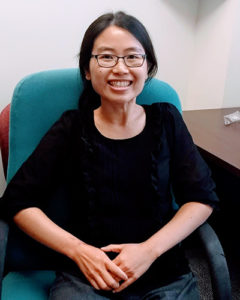 Yee Mon Thu describes herself as “a scientist who likes to learn how the natural world works — and an amateur artist who likes to use imagination.”
Yee Mon Thu describes herself as “a scientist who likes to learn how the natural world works — and an amateur artist who likes to use imagination.”
Before arriving at Allegheny, Thu taught biology at her undergraduate alma mater, Grinnell College. She earned a B.A. in biology with a concentration in global development studies there before completing a Ph.D. in cancer biology at Vanderbilt University.
“I am interested in how cells maintain genome stability in the face of intrinsic and extrinsic factors that can cause DNA damage,” Thu says of her research. “I am also fascinated by the involvement of these pathways in cancer.”
When away from the classroom and laboratory, Thu enjoys visiting national parks.
Birgit Weyhe
Max Kade Writer in Residence
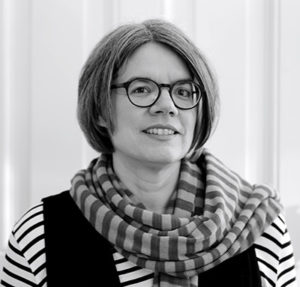 As a graphic novelist, Birgit Weyhe uses both her writing and drawing to explore historical and political incidents. She’s primarily interested in migration and the definition of home and identity. In addition to authoring several books, Weyhe has a monthly page in a Berlin newspaper where she draws the “lifeline” of a person who has changed places of residence often.
As a graphic novelist, Birgit Weyhe uses both her writing and drawing to explore historical and political incidents. She’s primarily interested in migration and the definition of home and identity. In addition to authoring several books, Weyhe has a monthly page in a Berlin newspaper where she draws the “lifeline” of a person who has changed places of residence often.
Weyhe was raised in Uganda and Kenya and came back to Germany at the age of 19. “I consider all three countries as my home,” she says. After returning to Germany, she earned a master’s degree in German literature and history from the University of Hamburg and a Diplom in illustration from the University of Applied Sciences, also in Hamburg.
Since 2012, Weyhe has taught at the Universities of Hamburg, Kiel and Düsseldorf in Germany and at the National Art School in Maputo, Mozambique. She also has led workshops at the German Cultural Center (Goethe Institut) in Argentina, Uruguay, Brazil, Finland, France and Canada.
Wehye said that she is a passionate reader. On a three-month trip to Patagonia last year, she and her husband read 15 novels to each other. “We praised the invention of eBooks,” she says. “Otherwise our backpacks would have been very heavy.”
Tarah Williams
Visiting Assistant Professor of Political Science
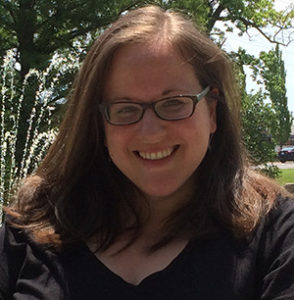 Tarah Williams uses survey and experimental methods to understand how social identities —partisan identities, racial identities and many more — shape individual political behavior, for better or worse. Her current research explores whether and when individuals will confront prejudice and discrimination in their daily lives.
Tarah Williams uses survey and experimental methods to understand how social identities —partisan identities, racial identities and many more — shape individual political behavior, for better or worse. Her current research explores whether and when individuals will confront prejudice and discrimination in their daily lives.
“As a shy person, I often struggled to speak up as a student,” she says. “My job now requires me to help students find ways to participate in class, and because I needed to work to find my voice, I have become committed to helping others find theirs. Similarly, my research is concerned with how we can encourage people to speak up to confront prejudice.”
Williams earned her B.A. and Ph.D. in political science from the University of Illinois. Before pursuing graduate school, she worked in state government as a researcher for the Illinois Legislature. She has taught courses in politics and policy at Washington University in St. Louis, Miami University in Ohio and the University of Illinois.
Along with her teaching and research, Williams enjoys walking, cooking, musical theatre and — since arriving at Allegheny — exploring Meadville.